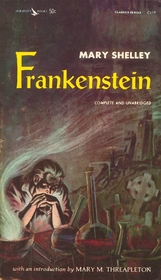Our editor-in-chief Nate Yapp is proud to have contributed to the new book Hidden Horror: A Celebration of 101 Underrated and Overlooked Fright Flicks, edited by Aaron Christensen. Another contributors include Anthony Timpone, B.J. Colangelo, Dave Alexander, Classic-Horror.com's own Robert C. Ring and John W. Bowen. Pick up a copy today from Amazon.com!
Cold Reads: Frankenstein by Mary Wollstonecraft Shelley
Out of all the novels up for examination this month, Frankenstein, penned by 19-year-old Mary Shelley, has been critiqued, studied, and anatomically dissected (no pun intended) by literary analysts big and small. Everything that could have possibly been discussed already has been... and then was discussed some more. Therefore, it is somewhat intimidating for a meager blogger such as myself to delve into the multiple complexities and interpretations that arise from this landmark in horror and the world of literature as a whole without repeating things that have already been said. But there is a thunderous rumbling in the sky that urges me forward and compels me to continue in my dark studies. So with the eagerness of the devoted student of midnight, I will compile together a creature that will hopefully be more appealing to the eye than Shelley's tragic monster.
The harrowing tale of Victor Frankenstein and his attempts to emulate Nature's power to create is a story that people of all ages can most likely remember as clearly as their favorite bedtime fairy tale. But there are no charming princes or Happily Ever Afters™ for the characters of Shelley's story. Victor Frankenstein, having an almost insatiable thirst for knowledge since boyhood and reading of the medieval alchemists, enters college determined to accumulate information on all learned subjects. When Victor's mind turns to creating his very own species, the possessed student resorts to collecting body parts from churchyards and charnel houses to construct his perfect being. But alas, when Victor accomplishes his goal and the creature is bestowed life, the creator shuns the abhorrent form of the "monster"... setting in motion a series of events that will end in misery and woe for the both of them.
Despite the appearance of the gruesome subject matter, Shelley's novel possesses an enchanting, lyrical beauty that fills the reader's heart with an overwhelming pathos that goes out to both Frankenstein and his creature. Even from Robert Walton's opening words, Shelley writes in a way that one can only say is profoundly beautiful. These emotions are usually registered when the characters are observing something that is, to them, completely new and heavenly in nature. Frankenstein and Walton discuss the wonders of Nature, from the icy plains of the Arctic to the titanic mountains of Europe. The pure majesty of these descriptions takes the reader away into the world of the characters and makes them feel as if they are witnessing the grand spectacles themselves. It is somewhat ironic that both men hold so great a value for these earthly beauties created by some almighty being, but at the same time, whether consciously or not, both are seeking to emulate and possibly replace this creator by discovering and exercising its sacred powers.
The Creature's descriptions of the De Lacey family's activities also capture the attention of the reader. Having not had a normal existence by any means, the Creature watches from his hidden hovel in rapt interest at the functions of the family as they go about the daily chores and duties that we all take for granted. The simplest and most insignificant parts of our day-to-day lives are observed by the Creature as magnificent wonders in which he wishes to be a participant. It opens our hearts and later our minds to the Creature's desires and wants.
The Creature tries to gradually expose himself to the family whom he believes to be kind-hearted and open-minded. In perhaps the most powerful episode of the entire novel, the Creature begins to make some progress with the eldest member of the clan who happens to be blind. But just before he reaches the summit of his arduous journey, the rest of the family comes home and misinterpret the scene. This climax hits us hard, a cement block blow to the chest, and readers may catch themselves internally screaming "No!" This deep connection might not have been possible if it was not for Shelley's expert portrayal of all her misguided characters.
There is an ongoing struggle not just occurring between Frankenstein and the Creature, but in the reader's mind as well as the story progresses. It is not a hard task to revile Victor for his unforgivable hubris and cruel abandonment of his creature, but he later forsakes his dark acts and realizes his mistakes. The same is thought of the Creature himself; we cheer him on as he attempts to slowly integrate himself into the human race, but he is always turned away simply on the basis of his disfigured countenance. It seems perfectly natural for him to seek vengeance against Victor for not being the guiding light he so desperately needed.
But just because they may seem justified on face value, are the Creature's actions truly good? He is fueled mostly by the idea of creating as much misery for Victor as he has suffered throughout his short but bleak life. This hardly seems the thought process of a completely benevolent and pure being. And, like Victor, the Creature is later repulsed by his horrendous acts and seeks atonement for his crimes. Whose side should we be on then? Who is the true "monster" in this case? Do either one of them deserve the treatment they receive? These questions are constantly asked even until the story's conclusion and, chances are, will continue to be asked even after the book is finished. This book isn't demanding answers though. It simply poses them to the reader and allows them to think what they will, which is undoubtedly the reason for the countless essays and studies written concerning it.
Usually touted as being a horror classic, Frankenstein seems more akin to the famous tragedies of Greece and Shakespeare. The most horror-esque scene in the entire novel, as you've probably guessed, is the infamous scene of the monster's creation. Having collected all the ligaments and parts of cadavers from the darkest and dankest of graves, Victor gives his creation unholy life in a trance-like state one dreary November night. But don't expect an electric light show courtesy of Spencer's Gifts or even Edison's bubbling cauldron from the 1910 film version. Victor (and Shelley) never discloses the life endowment process to the reader. In the context of the story, Victor tells Walton that he doesn't want others to make his same horrible mistakes. But on another level, this creates a whole new sense of mystery surrounding the Creature's origins and adds to his shadowy, less-than-human aura.
I see the novel as a grand performance of one of humankind's oldest themes: the rise and descent of Man. It is a drama that unfolds in such a way that you can't help but emotionally invest yourself in every one of the characters and their fates. I feel that if one were to go into the novel looking for the subject of their next thesis that the book's true impact would be lost. I feel it should be read as a visceral, emotional piece, for the whole spectrum of the human condition is illustrated in every chapter. You will feel a terrible anger at Victor's unjust rejection of his own creature; a horrible pain will rack your soul when you witness the Creature's attempts to gain companionship, only to be met by blind hatred; and a strange comfort will settle over you when both the creator and the created meet their final peace.
Let the emotions wash over and chill you like the icy waves of the northern lands that the book's conclusion takes place in. You are bound to never forget the book's haunting passages for they will constantly be with you, a restless spirit whose face can never escape your mind. Just before the creature departs for his final mission, he leaves Walton saying this: "He is dead who called me into being; and when I shall be no more, the very remembrance of us both will speedily vanish." You may be gone, Frankenstein, but you shall never truly be forgotten.








